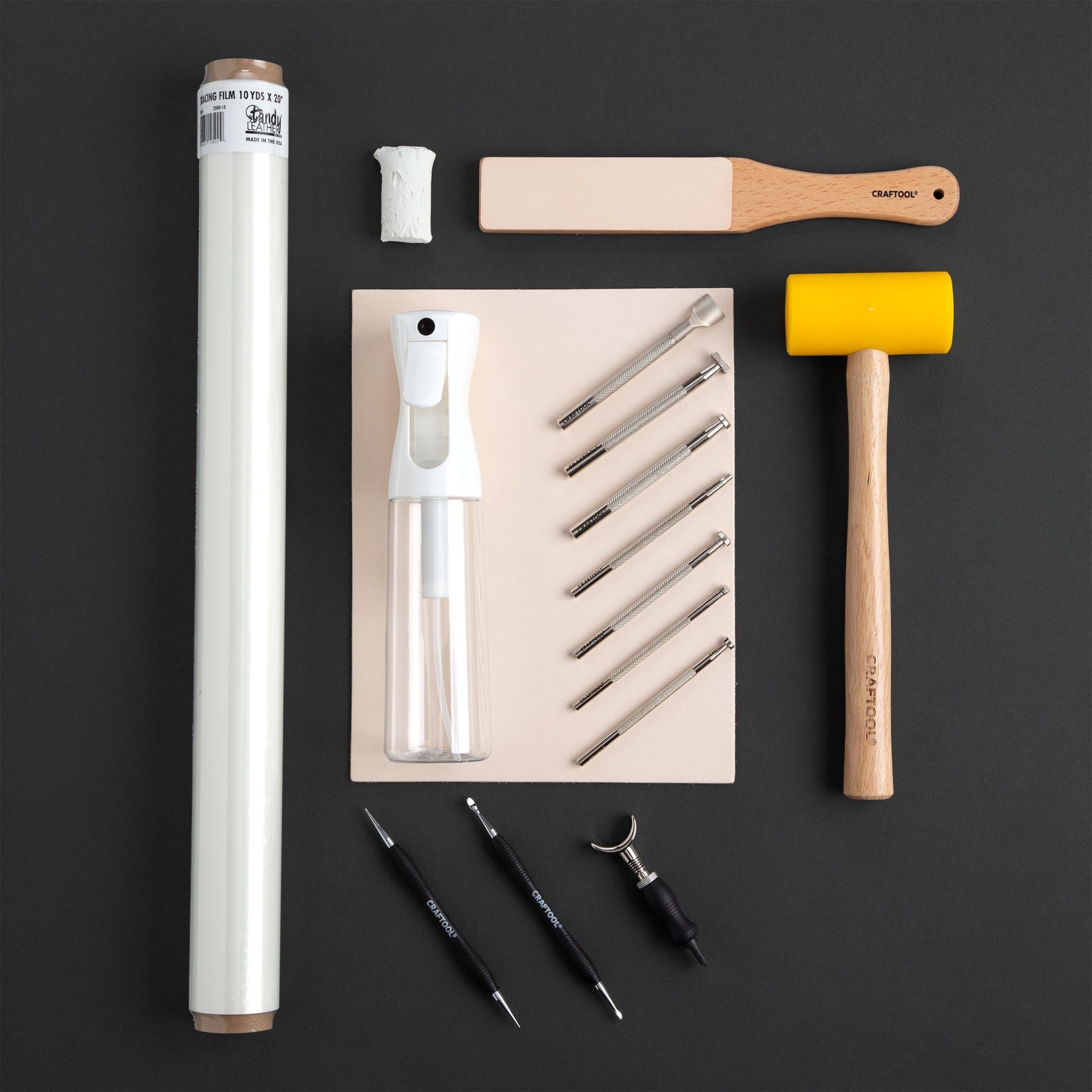All Leathercraft Library patterns and projects are property of Tandy Leather. Projects and patterns available are a part of the Tandy Leather Archive and may contain outdated product information or service offerings. Projects and patterns can be reproduced for personal use by printing, but Tandy Leather cannot guarantee the quality of reproduction or printing due to the image quality available. Some project and pattern themes or motifs may not be representative of Tandy Leather’s current views.

Getting Started In Tooling: Florals & Beyond
Leather carving, or tooling, is a skill that opens up a world of creativity and personalization. While traditional floral patterns are a staple of the craft, there’s so much more to explore! Whether you’re a beginner looking to master florals or eager to push beyond them into geometric, wildlife, or abstract designs, this guide will help you get started on your tooling journey.
Mastering the Basics: Florals First
Floral patterns are often the first designs beginners learn in leather carving because they teach essential techniques like swivel knife control, beveling, and shading. Classic Western floral tooling, such as Sheridan-style scrolls, helps build a strong foundation in depth and flow—skills that will apply to any design you tackle later on.
Expanding Beyond Florals
Once you’re comfortable with floral designs, you can start branching out into other styles. Expanding your skillset not only adds variety to your work but also helps develop new techniques that can enhance any project.
Popular Non-Floral Carving Styles
1. Geometric and Repeating Basketweave Patterns
For a clean, structured look, geometric designs and basketweave patterns provide an excellent alternative to florals. These can be created using carving techniques or combined with stamping for added depth and contrast. Geometric patterns are great for belts, wallets, and notebook covers, adding a sleek, modern appeal to your work.
2. Celtic and Filigree
Celtic knotwork and filigree patterns offer a flowing yet structured alternative to traditional floral designs. The interwoven lines of Celtic art require precision and symmetry, while filigree designs emphasize delicate cutouts and intricate detailing. These styles work well for belts, book covers, and decorative panels, adding an elegant and timeless aesthetic to leather projects.
3. Abstract and Modern Designs
Abstract carvings, like swirling lines, asymmetrical patterns, or even urban-inspired artwork, provide a contemporary feel to leatherwork. These designs often rely on negative space, sharp cuts, and smooth beveling to create a bold visual impact.
4. Lettering and Custom Logos
Hand-carved lettering and logos add a personal touch to leather goods. Whether it’s initials, a brand name, or an elaborate monogram, lettering techniques involve precise cuts and careful beveling to make the design stand out.
Essential Tools and Techniques for Carving
No matter what design you choose, the following tools and techniques will be essential:
-
Swivel Knife: Used for making precise cuts that define the design.
-
Bevelers: Create depth and dimension by pressing down the background.
-
Shaders & Background Stamps: Add texture and contrast to enhance details.
-
Modeling Tools: Perfect for refining details in wildlife, lettering, and abstract designs.
Getting Started with Your First Project
-
Pick a Design: Start with a simple floral pattern before experimenting with geometric or animal designs.
-
Trace and Transfer: Use tracing film to transfer your design onto dampened vegetable-tanned leather.
-
Cut and Tool: Use your swivel knife to carve the lines, then use bevelers and shaders to create depth.
-
Experiment and Practice: Try different styles on scrap leather to build confidence before committing to a finished piece.
Take Your Tooling to the Next Level
Leather carving is a skill that grows with you. While florals provide a great starting point, exploring different styles allows you to create truly unique and personalized leatherwork. Whether you stick with traditional patterns or branch out into new territories, the key is to keep practicing and pushing your creativity.
So, grab your tools, start carving, and have fun exploring the world of leather tooling—florals and beyond!


